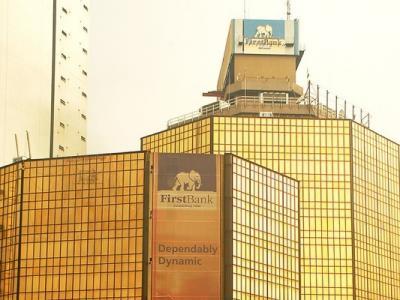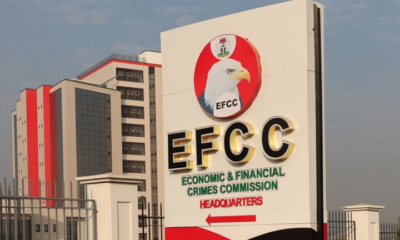Finance
Corruption: EFCC moves against Odili, Okonjo-Iweala and others

ABUJA—The Economic and Financial Crimes Commission, EFCC, is set to reopen the trial of high profile politicians whose corruption cases had either been delayed or put in abeyance as a result of court injunctions.
A top management officer of the EFCC told Vanguard, yesterday, that the commission under the leadership of acting chairman, Ibrahim Magu, was bent on reopening all the corruption cases involving top politicians, who were shielded by the court through perpetual injunctions that had temporarily tied the hands of the commission from prosecuting them.
Top on the list of those whose cases are to be reopened, is former Rivers State Governor, Dr. Peter Odili, who secured a perpetual injunction from a Federal judge barring the EFCC from investigating his eight-year tenure over alleged graft.
Justice Ibrahim Buba had granted a perpetual injunction restraining the EFCC from probing graft allegations its operatives levelled against the former governor.
The commission, however, filed an appeal against the ruling, which was described as strange by legal pundits. But the appeal has not made progress since it was instituted over four years ago.
However, the top EFCC operative vowed in an interview with Vanguard that all stumbling blocks to reopening the cases and similar ones would be removed by the Magu administration at EFCC with a view to bringing the former governor to book.
The top operative said that the new Criminal Justice Administration Act of 2015 has removed the stumbling blocks to prosecuting those who looted the nation’s treasury.
The senior management official of the commission said: “Let it be made clear that the EFCC will go after all cases that are deserving of investigation. There is nothing like perpetual injunctions anymore in our criminal administration justice code.
“We have a duty to investigate all cases since we are empowered by the Constitution of the Federal Republic of Nigeria to investigate all such corruption-related cases and that is what we are asked to do.
“We are empowered by Section 15 of the new Criminal Justice Administration Act to investigate all cases irrespective of injunctions. We cannot be stopped,” the official said.
The source confirmed that top officials in the administration of former President Goodluck Jonathan, who abused their office by fritting away huge national cash and assets would be summoned to clear the air on why they breached public trust.
Among those slated for questioning are former Minister of Finance & Coordinating Minister of the Economy in the last Administration, Dr. Ngozi Okonjo-Iweala and some former officials of the Central Bank of Nigeria, CBN, who handled the disbursement of funds to the Office of the National Security Adviser, ONSA.
Asked when the officials would be summoned, the official said no date had yet been fixed, adding, “I will find out and get back to you.”
In the meantime, the EFCC Chairman, Mr. Ibrahim Magu, has established a Procurement Fraud Unit, PFU, to strengthen the fight against corruption in the country.
The Head of Media and Publicity of the EFCC, Mr. Wilson Uwujaren, said in a statement to Vanguard, last night, that Magu made the disclosure in Abuja yesterday during a meeting with leaders of a coalition of civil society organisations.
Uwujaren said that Magu expressed concern over the increasing rate of procurement fraud and told his guests that the PFU would contribute immensely to the anti-corruption battle when it became operational.
“I am so concerned about procurement fraud. I am thinking of establishing a unit dedicated to procurement fraud. When put in place, it will go a long way in checking corruption,” Magu said.
Vanguard-
Business
Nigeria pays US$4.9 billion on petrol subsidy in 2024- NNPCL
It was however noted by Biztellers.com.ng, that although subsidy is back in effect, the main reason for that is the increasingly weak state of the Naira and the country’s extreme dependence on products importation. Also unlike the previous subsidy era, where several oil marketers were getting free subsidy refunds for unverified product importation, this subsidy era is witnessing only one importer, the NNPCL, which in effect is the sole receiver of government subsidies.
Yemie ADEOYE
INSPITE of the official position of the Nigerian government that the controversial petrol subsidy is gone for good as announced by the President on assumption of office, the state owned Nigerian National Petroleum Corporation Limited, NNPCL has disclosed that petrol subsidy is still fully operational in Nigeria, although, under a different identity.
Umar Ajiya, Chief Financial Officer at the NNPCL, disclosed that it cost the company a staggering N7.8 trillion (US$4.9) to cover this price gap in the first seven months of 2024.
Rather than simply referring to these claims as subsidies, he stated that the company is merely managing the price difference in petrol imports on behalf of the federation, stressing that this should not be misconstrued as a return to subsidy payments.
![]() This revelation has reignited discussions on whether the NNPC is indirectly offering subsidies, a concept typically defined as selling a product below its cost price.
This revelation has reignited discussions on whether the NNPC is indirectly offering subsidies, a concept typically defined as selling a product below its cost price.
Documents reviewed by Biztellers.com.ng showed that the term “subsidy” was used extensively in official correspondence between the NNPCL and the presidency, particularly in reference to the “shortfall.”
Recall that President Bola Tinubu reportedly approved NNPC’s request to utilize the 2023 final dividends due to the federation to offset these costs.
However, during a media briefing on Monday about the company’s 2023 audited financial statements, Ajiya refuted claims that the NNPC is involved in any subsidy scheme.
Ajiya further disclosed that the Nigerian government owes the NNPC N7.8 trillion ($4.9 billion) in subsidy-related debts for the period from January to July 2024.
In furtherance of his clarification to the News Agency of Nigeria (NAN), Ajiya insisted that no subsidy payments have been made to any marketer in the last nine years, citing the NNPC’s role as the sole importer of petrol under supply contracts.
He said, “In the last eight to nine years, NNPC Ltd. has not paid anyone a dime as a subsidy; no kobo has been disbursed by NNPC Ltd. in the name of subsidy. No marketer has received any payment from us for subsidy.”
“What has been happening is that we have been importing PMS, which has been landing at a specific cost price, and the government tells us to sell it at half price. So the difference between the landing price and that half price is a shortfall.
“And the deal is between the Federation and NNPC Ltd., to reconcile, sometimes they give us money, so there is no money exchanging hands with any marketer in the name of subsidy.”
Ajiya remained silent on how much of the $4.9 billion could have been remitted to the federation account if the NNPC had not been covering the “shortfall.”
It was however noted by Biztellers.com.ng, that although subsidy is back in effect, the main reason for that is the increasingly weak state of the Naira and the country’s extreme dependence on products importation. Also unlike the previous subsidy era, where several oil marketers were getting free subsidy refunds for unverified product importation, this subsidy era is witnessing only one importer, the NNPCL, which in effect is the sole receiver of government subsidies.
Banking
CBN Denies Currency Devaluation

The Central Bank of Nigeria (CBN) has refuted claims of devaluing the.
Earlier reports suggested that the CBN had devalued the Naira, lowering its exchange rate from N631 to the dollar, compared to the previous day’s rate of N461.60 at the Importers and Exporters (I&E) window.
However, the Central Bank of Nigeria (CBN) released a statement on Thursday through its Acting Head of Corporate Communications, Dr. Isa Abdulmumin, categorizing the report as false information.
In the statement titled ‘CBN Has Not Devalued The Naira’, he said the attention of the apex bank was drawn to the news report by an Abuja based newspaper edition of June 1, 2023, titled “CB Devalues Naira To 630/51”.
However, the CBN stated categorically that the news report was replete with outright FALSEHOODS and destabilizing innuendos, ‘reflecting potentially willful ignorance of the said medium as to the workings of the Nigerian Foreign Exchange Market.’
“For the avoidance of doubt, the exchange rate at the Investors’ & Exporters (I&E) window traded this morning (June 1, 2023) at N465/USS1 and has been stable around this rate for a while.
“The public is hereby advised to ignore the news report by Daily Trust in its entirety, as it is speculative and calculated at causing panic in the market,” the CBN spokesman added.
He, therefore, advised media practitioners to verify their facts from the Central Bank of Nigeria before publishing in order not to misinform the public.
Banking
BREAKING: CBN Increases Interest Rate By 0.5%

The interest rate in Nigeria has been raised to 18.5 percent, up by 0.5 percent, from 18 percent where it was pegged in March 2023.
The Central Banks of Nigeria’s (CBN) Monetary Policy Committee (MPC) resolved to this effect at its third meeting of 2023 in Abuja, on Wednesday.
Governor, CBN, Godwin Emefiele, made the disclosure in the communiqué of the MPC’s meeting, thereafter.
While engaging the media at the end of the two-day meeting, Emefiele, said the committee voted to keep the asymmetric corridor at +100 and -700 basis points around the MPR.
In the view of the MPC, rising inflation rate is traceable to the high energy cost and challenges around the supply chain, among others, which lie outside the corridors of the CBN.
Emefiele said, “The current trend in price development would continue to be monitored by the bank with greater collaboration with fiscal authority to address the drivers of inflation.”
Biztellers reports that the CBN had effected six consecutive interest rate increases, which has seen the rate move from 11.5 percent in March 2022 to 18.5 percent in May 2023.




















